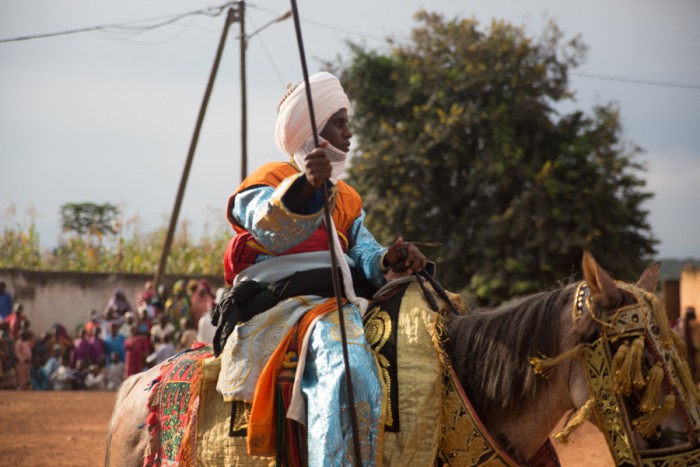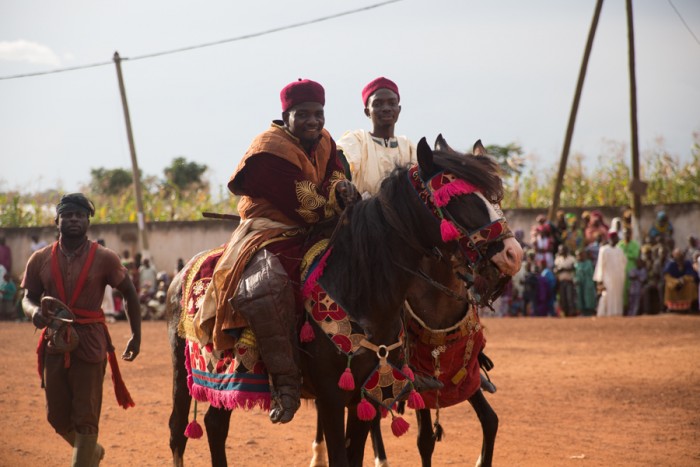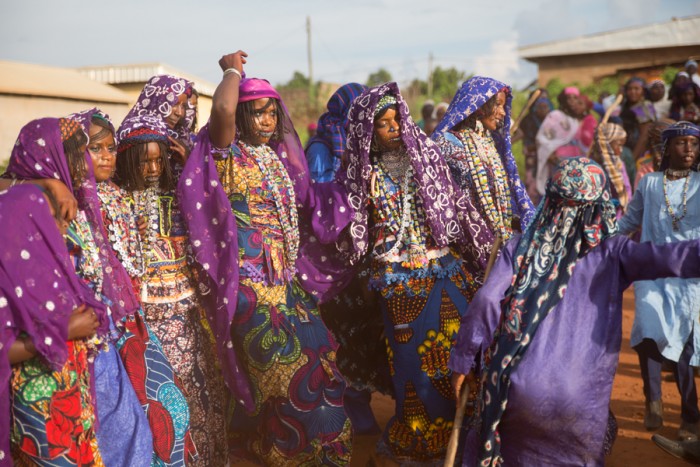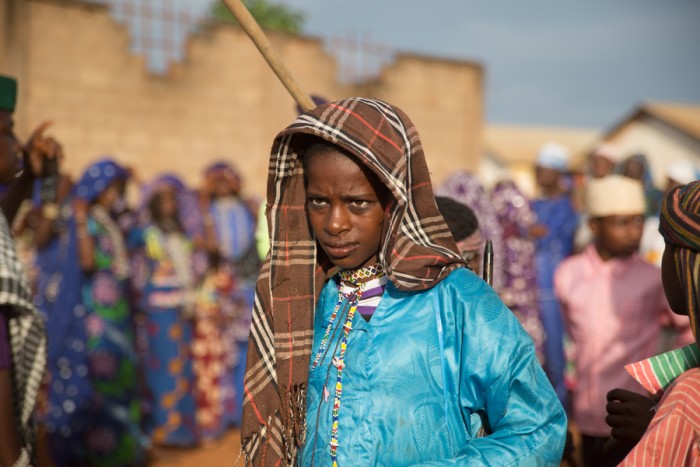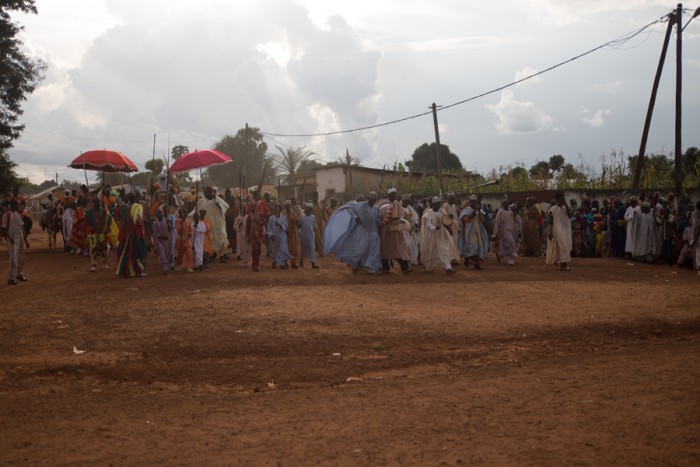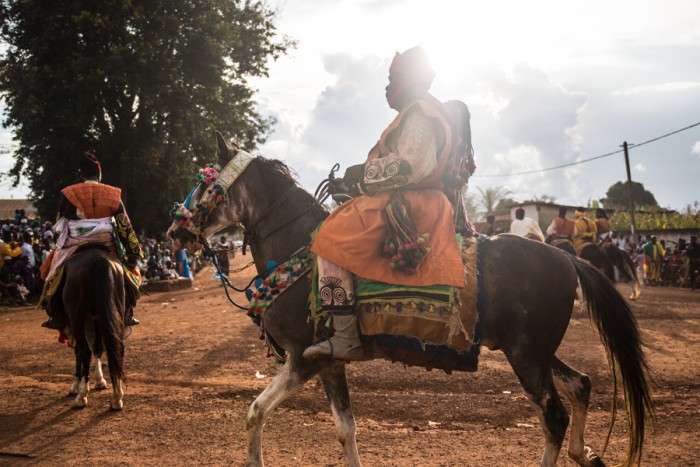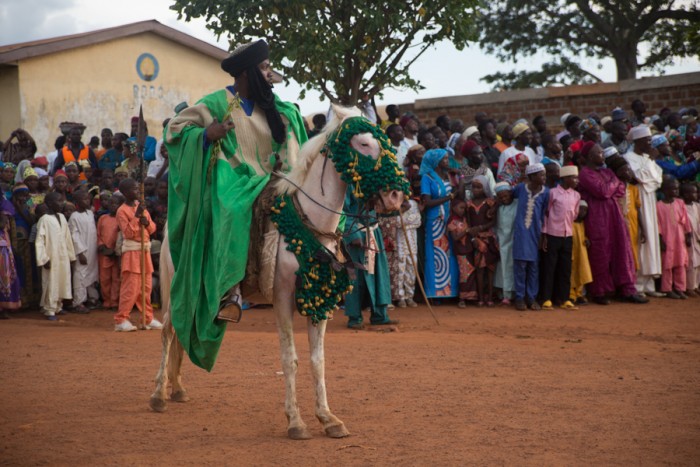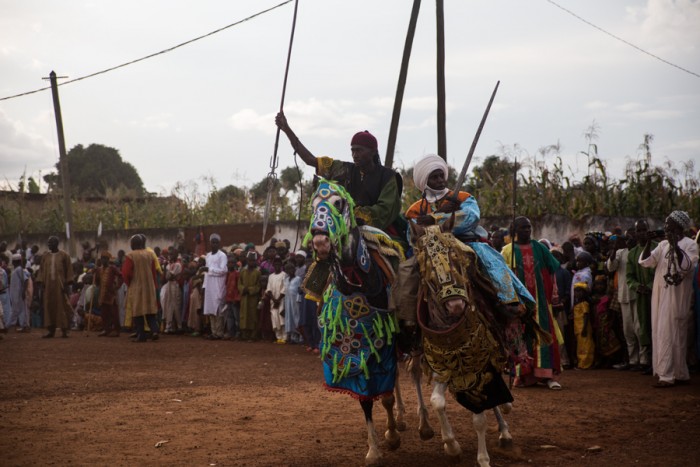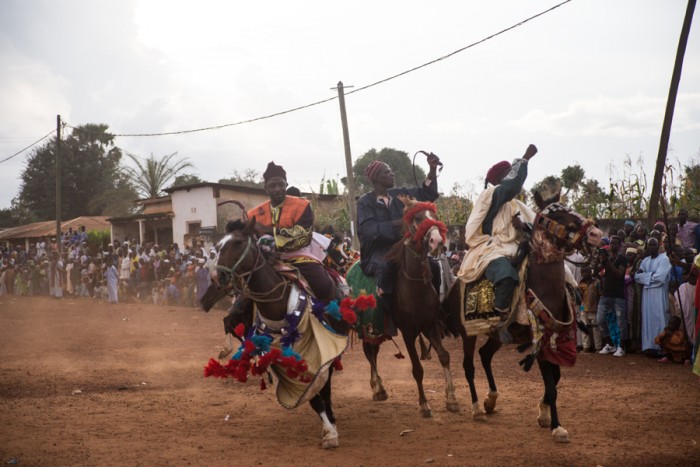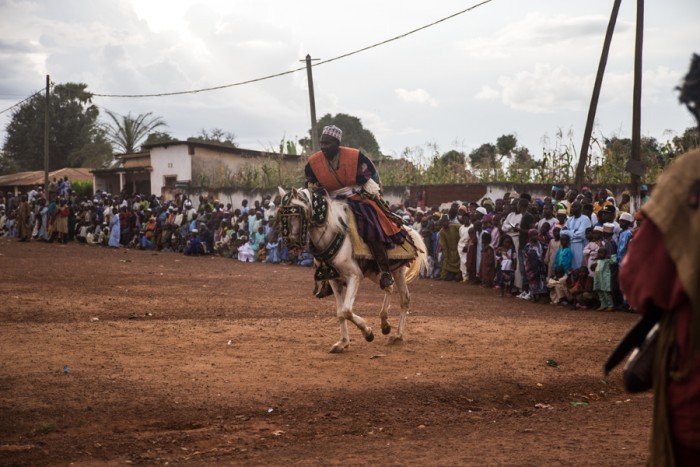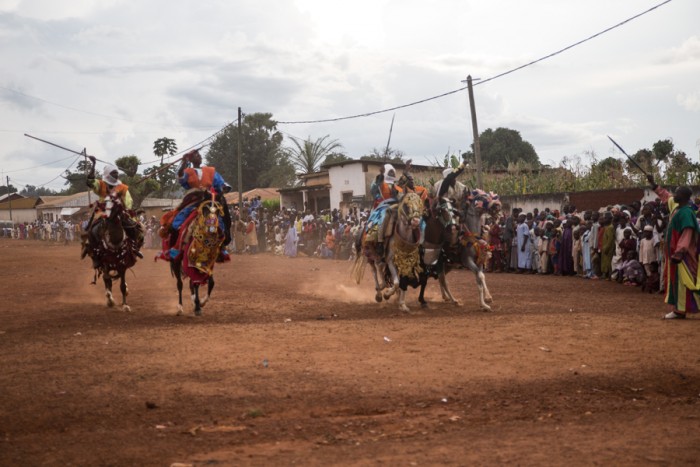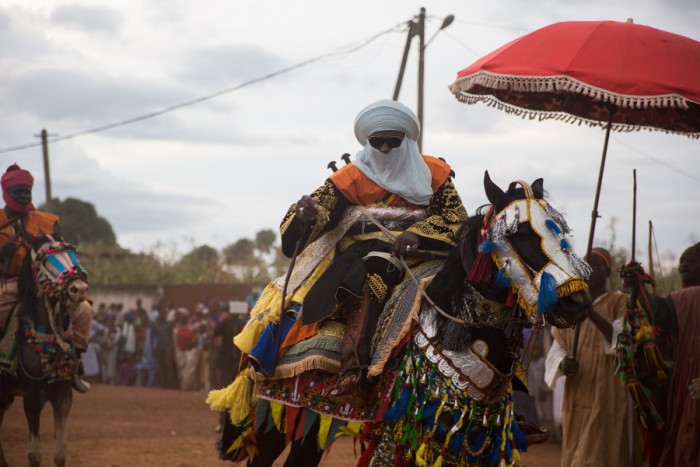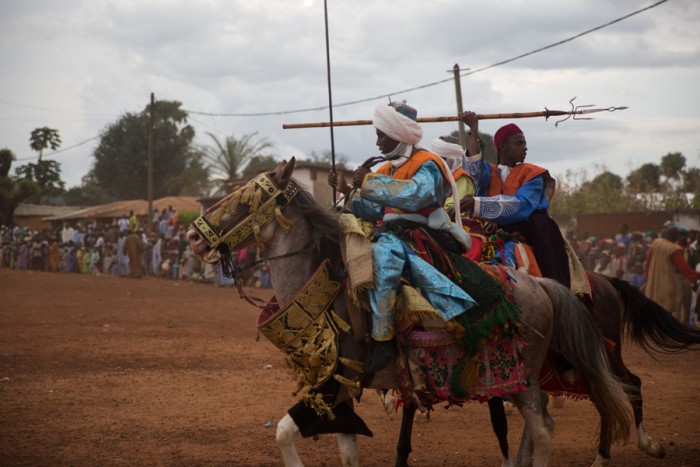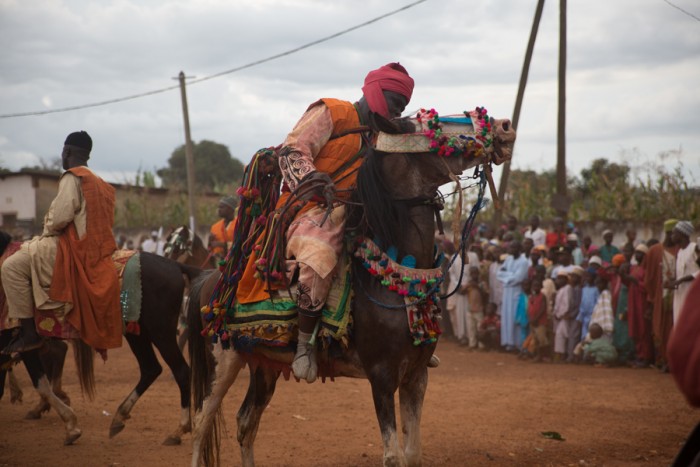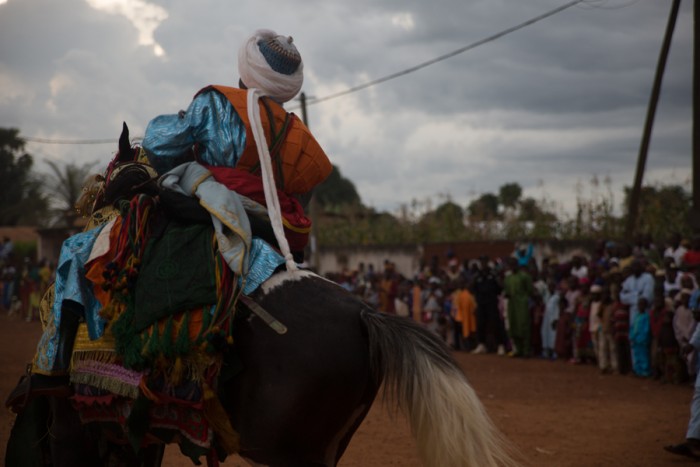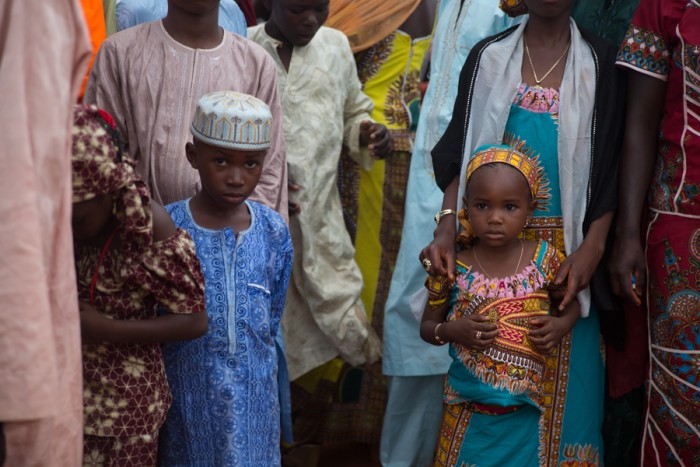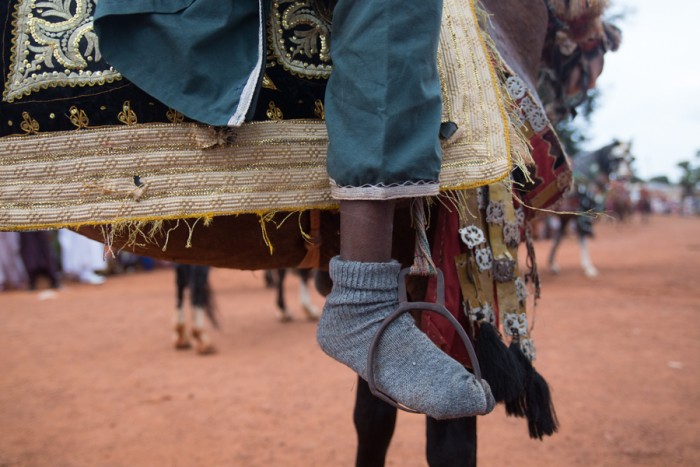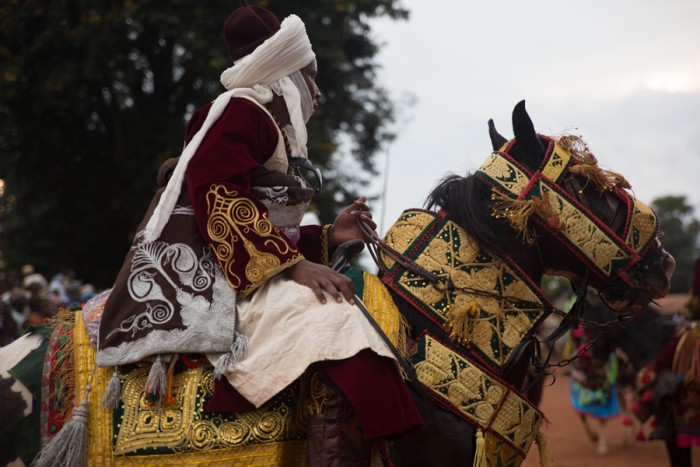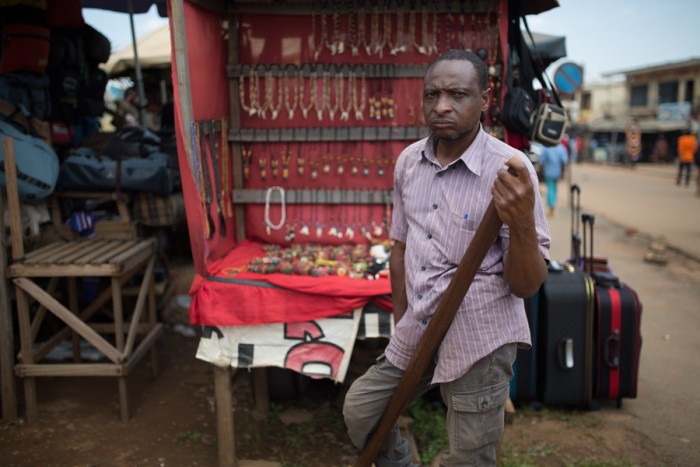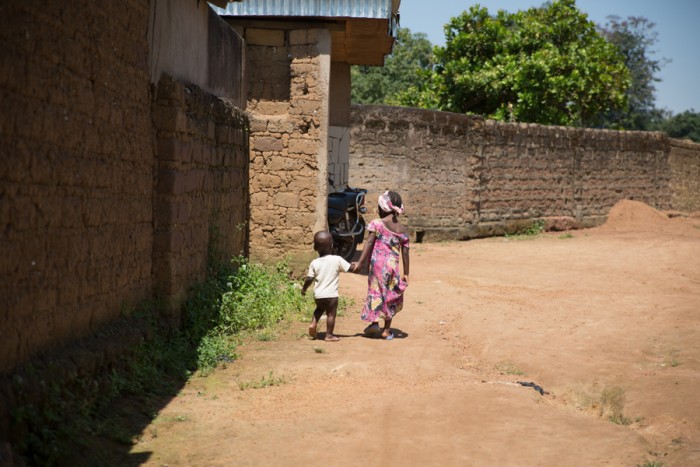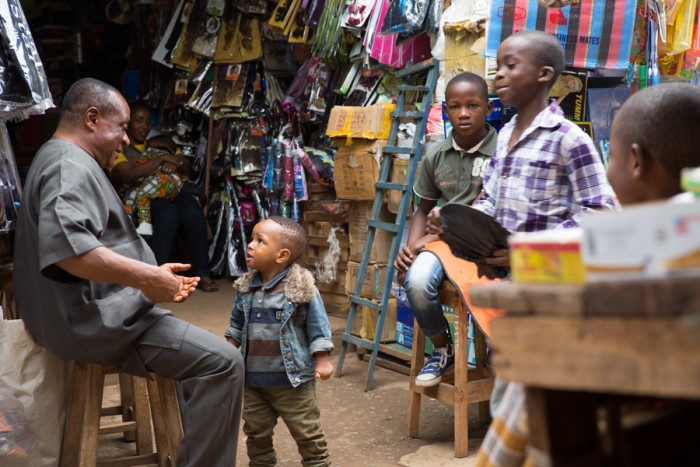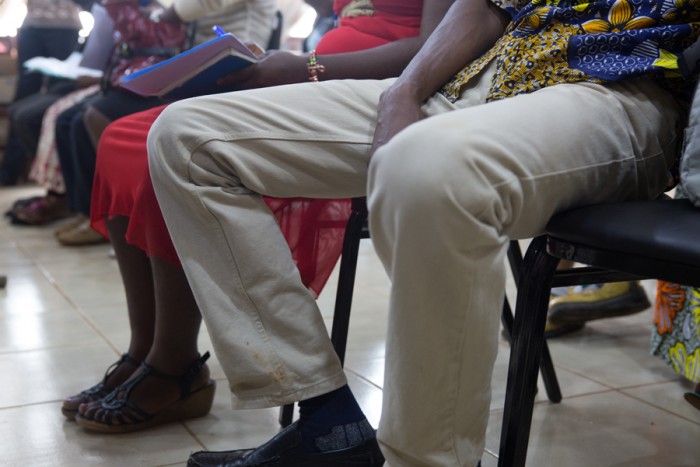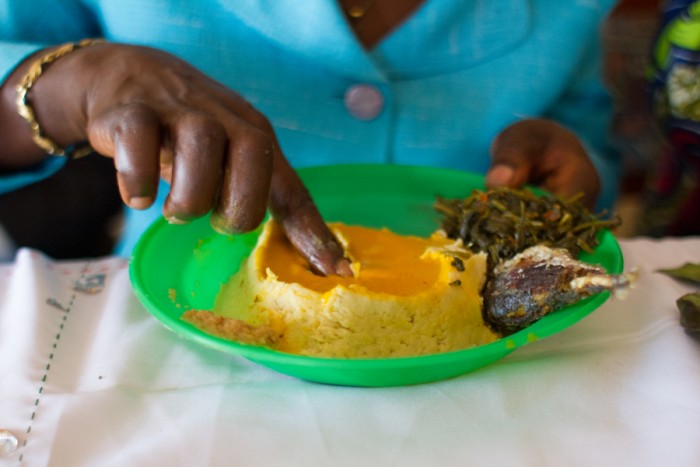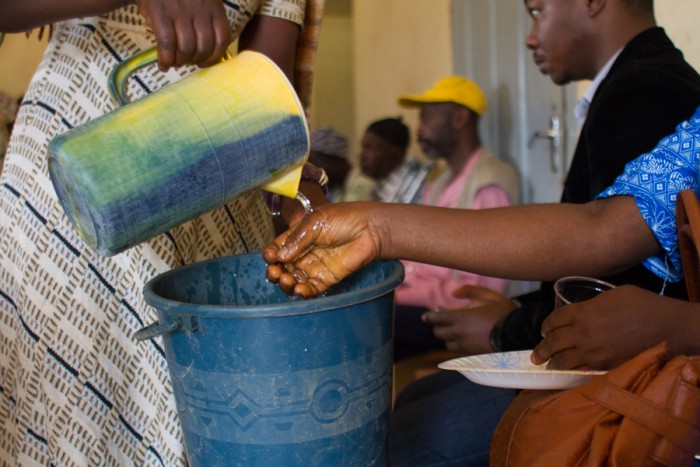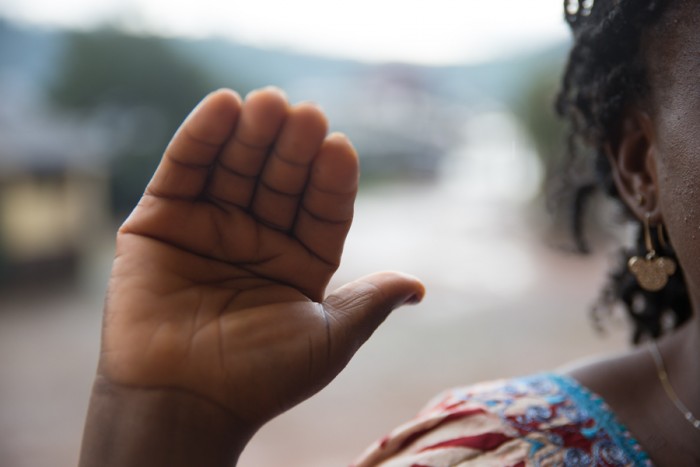July 9th, 2016 by Rachel | Tags: Peace Corps, Photo Essay, Photography | No Comments »
Two days after when Muslims end their about 30 days of fasting and have their big feast, which is known as End of Ramadan, some towns in Cameroon, in particular those with large Muslim populations in the Grand North region, host an occasion called “Fantasia.” It’s an event when community members from the town and nearby towns come together to see a horse show. The horses are adorned with beautiful saddles, clothes, and fringes and the riders wear beautiful outfits. The community members honor Lamido, the traditional leader of the town. Then during the show, horses race down a street towards Lamido who is usually sitting on a horse watching the horses and riders racing. Lamido will sometimes participate in the race too. Once the horses and riders comes close to Lamido, they salute to him. They will sometimes use swords or raise fists as another way of greeting Lamido. The riders and horses will return back to beginning of the race and come racing again down the street. The cycle repeats for about 30 minutes.
Community members stand on the sides of the streets or sit at the end of the street to watch the show. They also play music and dance while the horse show is happening.
I had the opportunity to attend “Fantasia” while vacationing at Alex’s post in Adamawa. I have always wanted to see a horse show in Cameroon because I have seen images of them and admired the beauty of horses, especially how Cameroonians dress them up. Seeing the show was incredibly exciting and a worthwhile experience.
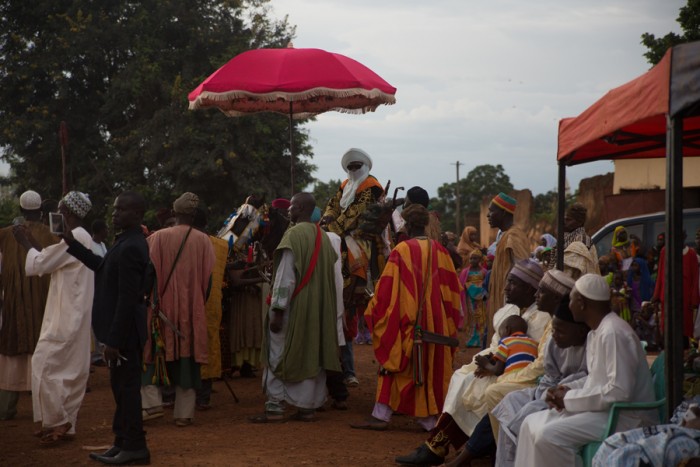
Lamido, who is under the red umbrella and wearing a white scarf, is a traditional leader of the town.
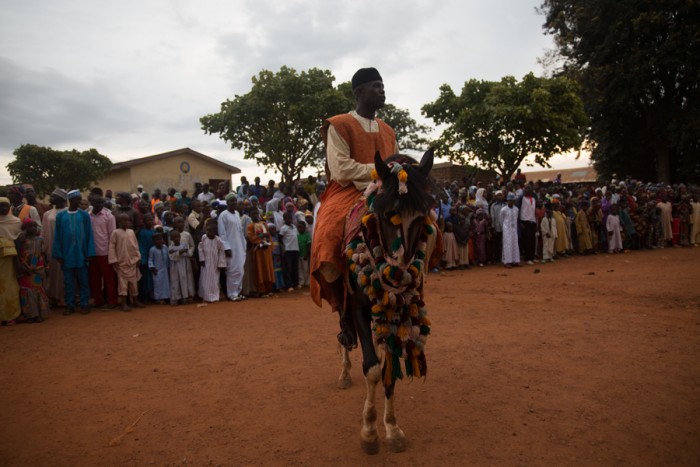
June 26th, 2016 by Rachel | Tags: Disability, Peace Corps, Persons with Disabilities of Cameroon, Photography | 1 Comment »
During the last seven months of my Peace Corps service, I am featuring photographs and stories of several persons with disabilities living in Cameroon. All the photos are part of a series called “Persons with Disabilities of Cameroon.” The goal of presenting photographs and their stories is to create better awareness about the plights that persons with disabilities face in a developing country. When I return to the US, I hope to exhibit this series in a gallery and publish a book to educate others about persons with disabilities living in developing countries as this topic is so rarely discussed in the media.
Galabe, a kind gentleman with a big heart tells me a moving story that breaks my heart.
“I have a physical condition. My right leg is paralyzed. I became disabled at 2 years old. Disability was caused by Quinamax injection,” said Galabe, “I was being vaccinated to be protected against malaria.” I was told that in the 1960’s, healthcare workers in Cameroon thought Quinamax could protect people from malaria but this was never true.
“When [my parents] discovered [my disability], they thought it was caused from witchcraft. After some time, two other people from the village had the same defect. The complaints came in nationwide and the effects of the drug and the research was done it was discovered that it was the injection that causes paralyses which progresses to polio,” said Galabe. When he mentioned the word “polio,” I think he means to say that paralyses progresses to a condition that akin to polio. Polio is an illness itself caused by a bacteria named poliomyelitis. One cannot acquire polio from the Quinimax injection.
“My family never neglected me like other families neglected persons with disabilities. So they treated me same like any other persons. They sent me to play football with the children. When we are going to the farm, we go together and work together,” said Galabe.
“When they were teaching me, I could produce my own food with my disability. They taught me how to wrap my leg around the stick to be able to till the soil,” said Galabe.
Galable finished primary school but he never had the chance to go to secondary school because the coffee market went down and thus, there was a crisis. His family’s farming focused on coffee. After primary school, he took care of his father’s cattle as a cattle grazer for three years. Then he moved from Southwest region to Kribi, a beach town in the South region of Cameroon.
“One of my uncles was living Kribi and took me in to stay with him. My uncle took me to training in metal work for two years. I did training workshop the owner training person demanded very high fee which the uncle was unable to pay. Then I switched over to do business work,” said Galabe.
After some time, he moved to Bamenda for business opportunities as his business was not going well in Kribi. Then he got married in 2004. He had five children. Twins twice.
His wife left him on June 7, 2015.
“I married her on June 7, 2004. We, persons with disabilities, always take proper care of the wife. And you know many women like to pick on the husband. Because of the environment changes, she met other women who would not respect their spouses, and so she copied it. She was told she was very beautiful and did not have the right to marry a person with disability. When any man wanted to approach the wife, [they asked] ‘why do you want to do with this man with impairment. It’s [better] to be with us.’ From there, she started to disrespect me and then she left,” said Galabe
Then Galabe shared with me about his struggles in becoming a single father of five children.
“The work is not too easy. First, I pass through stress. There are a lot things people say giving reasons why the wife leave me with the five children. Some would say it’s because she was not mature. Others [falsely] say [I] gave her substance for her to fall in love with [me] and now the substance is finished and that is why she left. I had met with many people to give me counseling. Then I said to myself ‘God cannot give me a job or work that I cannot do.’ Then I also accepted the responsibilities. I accept my lord. I know whatever is above me my lord will take it. Then from there I programmed myself. At 4 am, I have to get up and get ready for kids so that they will go to school on time. It was not easy to meet [the demands] with the children and the business. When I leave to take them to school, I come back to wash their dresses before coming to the market. Then by 12:30 pm I have to go back to school and take them back home. Give them food. Wash their uniforms to prepare for tomorrow so that they will be neat. So that inconveniences me to be at the market, [but I do go back to the market in the afternoon.] I [sell internet credit] and do beadwork. Also it makes me live from hand to mouth. The little you get, you spend it all. Like for example, the children needs food before they go to school. They also need school needs and their health and there is not enough money to handle the situation. I cannot invest to spend on their needs. I do not even have pleasure time to visit friends. Because when she left, the younger twins were two years and two months. They’re now three years.”
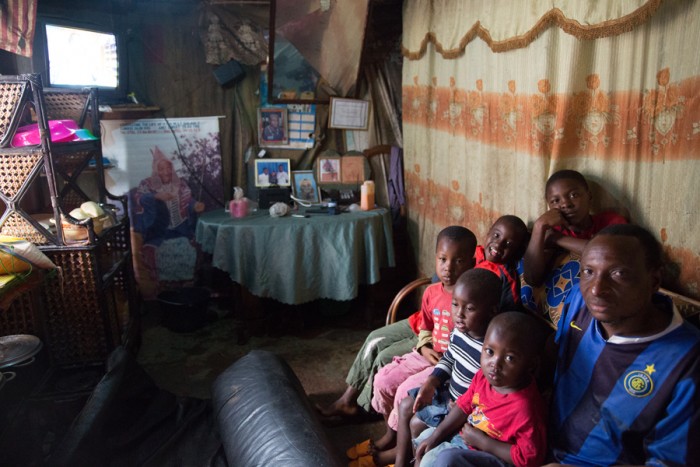
Galabe and his five children live in a one room home.
“It was not too easy with my situation. I took the challenge because many people encouraged me for the work I am doing. They encouraged me to continue. And God is taking control. And my stress is [becoming less]. My only inconvenience is living in single room with five children because of lack of finance,” said Galabe.
June 21st, 2016 by Rachel | Tags: Disability, Peace Corps, Persons with Disabilities of Cameroon, Photography | No Comments »
During the last seven months of my Peace Corps service, I am featuring photographs and stories of several persons with disabilities living in Cameroon. All the photos are part of a series called “Persons with Disabilities of Cameroon.” The goal of presenting photographs and their stories is to create better awareness about the plights that persons with disabilities face in a developing country. When I return to the US, I hope to exhibit this series in a gallery and publish a book to educate others about persons with disabilities living in developing countries as this topic is so rarely discussed in the media.
Damian, a young adult who was born in 1992 with double club feet, tells a story of perseverance and living positively.
“I was born in the health center. My parents were surprised because they have never seen this case in the family. And then they never gave up on me. The nurse was trying to fix the legs while she was not an expert. She tied the legs with bandage. The whole time I was crying because I was in pain because of the bandage she tied. When I got up the next day, they had to untie it because I was crying a lot. So when they untied it, they saw my legs were like bent. So they had to take me to another hospital called Kumbo Shisong Hospital. So the doctors could not do anything because of the scars. So there was nothing they could do. They just sent me back home. My father was advised to sue the nurse who bandaged me in court. My father said it was a weak of God that allowed me to grow up like that. They never knew I would walk. So, one day, my mom was heading to the farm when I was one year and five months. She surprising saw me trying to walk. So, in the old day, she stayed at home trying to make me walk because she thought I would never work because I would be crippling. She was so happy. So at five years, I started primary school. It was not easy because I could not buy shoes from the market because they were not designed to fit my feat. They were expensive to make and my mother could not afford it.”
He went to school with no shoes.
“I completed class 7 and my parents fully supported me. They never gave up. After class 7, I continued to secondary school with the shoe problem.”
He still had no shoes.
“My mother carried me to school. In form 2, I tried some shoes I could wear. I finally found shoes I could wear from the market and finally started wearing shoes. Thought at first it was painful to put shoes on until I discovered the soft shoes and I’m fine with that. During my secondary school, I’ve gone to so many hospitals but they could not correct the feet because of the scars that the bandage gave. So I learned to live like that. But one greatest challenge I have is that I don’t have the ability to stand on my own. I must support myself when I stand. It was not easy for me to walk around because children mock me. So I was always at home until my mom gave me the courage to forget about what the children were saying. So I go to the field and play football and I learned to live like that. So now I am happy to have a position to live like other children regardless of disability. When I finished secondary school, there was no money to continue. I had to work for two years to raise money to pay for my university. So now I’m in university studying accounting. I worked in documentation. I have passion for computer.”
June 20th, 2016 by Rachel | Tags: Peace Corps | No Comments »
In most parts of the US, people often criticize parents for not looking after their own children. Children are often prohibited from walking alone from their home to the town, park, or to school because parents fear that children will get hurt or be kidnapped or parents will be criticized for allowing their children to be independent. If a child crosses the street on his or her own, the child is punished severely. Last year, a couple was accused of being neglectful parents for allowing their children to walk home alone from a park. The children were taken in custody by police officers. Recently, many people have been accusing the parents of a boy who was killed by an alligator who snatched him and drowned him under water for not watching him and also the parents of the boy who walked through a fence at a zoo and got caught with a gorilla for not watching him too.
A Cameroonian friend told me that there is a saying in Cameroon, “The child is only yours when you are pregnant with the child.” In Cameroon, children roam freely everywhere in the city and village. They walk to school on their own or take a taxi or moto bike without any supervision. Parents often ask their children to go to the market on their own to buy food or basic necessity. When parents work at the market and bring their little kids, they allow their kids to run and play. Other store vendors will look after them by picking them up and holding them or playing with them. One time, when I was buying food from a vendor, she handed me her baby and asked me to hold her so that she could assist me. There is a strong level of trust between strangers to look after the children. When children want to visit friends, they freely leave the home without permission from the parents and walk on their own to other homes. When other children visit other homes, whichever adults are present take on the responsibility to look after the children without any hesitation. Moreover, children of all ages look after each other and their own safety. I’ve seen children holding each other’s hands and older children carrying little children.
Babysitters are rare and often limited to upper middle class and wealthy families where one spouse is working and the other is in school and if there is a time when both are not available, they will hire a babysitter. However, for everyone else, neighbors look after the children. For example, a little boy who may have a mother who works at the market will be looked after by everyone at the market while he roams around.
Cameroon truly has a communal culture where everyone takes a responsibility to help each other by looking after each other without any questions, especially children. It is very rare to hear one criticizing another for not being responsible for their own children. All in all, when a child is seen walking alone to a store, instead of accusing the parents for being neglectful, the people who see the child alone take on the duty without questions to watch the child.
June 19th, 2016 by Rachel | Tags: Peace Corps | No Comments »
In Cameroon, they have their own unique set of manners. While one manner may appear polite in the US, it can be impolite in Cameroon and vice versa. Also, certain body movements can mean differently in Cameroon, and Cameroonians may say certain phrases differently. I would like to share examples of how certain manners in Cameroon are different from the US.
• Do not cross your legs in Cameroon or you’ll be seen as a prostitute if you’re a female or ultra mancho if you’re a male. In the US, crossing legs is acceptable and is sometimes a formal way of sitting down.
• Eat fish, couscous and other various food with hands. Cameroonians are actually very good about making sure they wash their hands prior to eating. In the US, while there are certain foods that we do eat with our hands such as pizzas and sandwiches, there are certain dishes such as fish that we only eat with forks and knives.
• When inviting people out for a meal, you must pay for everyone who you invite. In the US, we pay for our own meals or split the bill.
• Shake hands when greeting, even when already knowing the person and in informal settings. In the US, we normally only shake hands when we meet new people or in formal settings such as when seeing a person for an important meeting.
• When waving by folding hands down in Cameroon, it means come here. In the US, it means bye bye.
• When you say you are sorry, you say “Ashia!” even if you’re an English speaker. In the US, the word “Ashia” does not exist and we just simply say, “I’m sorry.”
